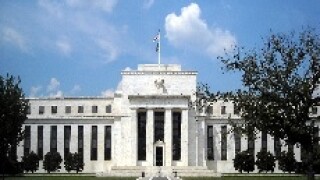News content
-
More hedge funds are looking into entering the market making industry, following in the footsteps of Citadel Securities.
-
US banks this week reported stellar returns from trading and underwriting in the first quarter, even as the bottom line was hit by gigantic writedowns and reserves for credit losses, as the economic and financial disruption from the coronavirus crisis took its toll.
-
The coronavirus pandemic has put some major market regulation on ice, but not the Ibor transition, the most far-reaching financial reform still on market participants’ to-do lists.
-
Banks have been building their financial sponsor coverage teams on a record period of deal making. Now they have a different fight on their hands, but bankers are playing down the threat of a 2008-style meltdown, writes David Rothnie.
-
Insolvency and restructuring practitioners have been catapulted into an unprecedented whirlwind of activity by the coronavirus, as even healthy companies suddenly find themselves staring over a financial precipice. In the UK, the government will change insolvency rules to ease these situations, but specialists believe there is more to be gained by using existing laws better.
-
US banks ramped up reserves for credit losses, expanded credit lines and enjoyed bumper trading and debt underwriting volumes in the first quarter, according to results released on Tuesday and Wednesday.
-
JP Morgan has taken an $820m writedown on its book of bridge loans, nearly halving its investment banking revenues for the first quarter. However, the bank is not hurrying to exit these positions. Chief executive Jamie Dimon said “a couple” of its bridges could be syndicated this quarter if conditions are supportive.
-
Speculation is building ahead of the International Monetary Fund spring meetings this weekend that the multilateral lender is poised to inject much-needed liquidity by printing billions of its own currency, Special Drawing Rights.
-
Reviews of key areas of legislation such as MiFID II, bank capital requirements and Solvency II have been pushed into the future, as the European Commission puts green and digital regulation first.
-
HSBC has overhauled the structure of its global banking business for the second time in as many years in a push to cut costs and bring its commercial and investment banking divisions closer together.
-
EU ministers finally managed to find agreement before the Easter weekend on a rescue package to help fund the bloc's response to the Covid-19 pandemic. But investors and analysts were far from convinced that critical debates about countries' ability to deal with the economic impact of the crisis and about the wider future of the EU have been settled.
-
The Federal Reserve’s decision to start purchases of high yield exchange traded funds and ‘fallen angel’ cash bonds has boosted the tone in European high yield, with syndicate bankers flagging an open market for the right names and sectors. But issuers remain on the sidelines, and dual-currency companies may opt to tap the dollar market instead.












